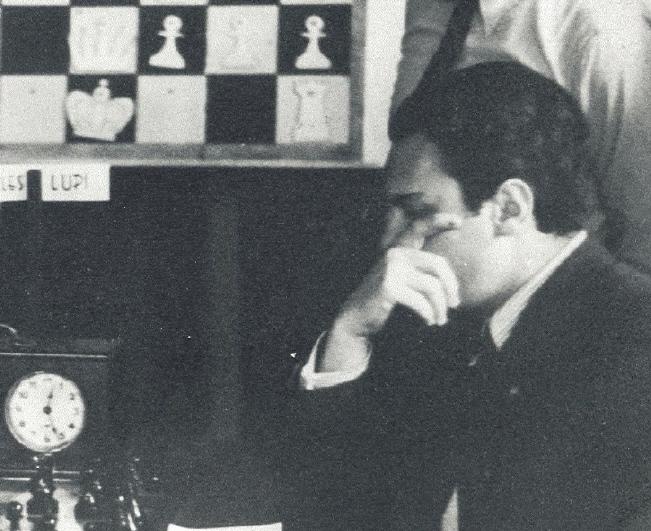
Edward Winter
It is surely high time that more was discovered about Francisco Lupi, a frequent opponent and companion of Alekhine during the world champion’s final phase. Readers’ help will be much appreciated.
Jeremy Gaige’s Chess Personalia gives no birth-date for Lupi, merely recording that he died in January 1954. On page 3 of A. Alekhine Agony of a Chess Genius (Jefferson, 1989) Pablo Morán wrote:
‘Francisco Lupi, Alekhine’s last serious opponent, was also his last friend. A noted Portuguese player, Lupi died in Madrid in 1954, scarcely past his prime. During the forties and early fifties, he played tournaments in Spain, a match in Zaragoza against Dr Rey Ardid and many simultaneous exhibitions.
I made his acquaintance in Gijón during the 1945 International Tournament ... In 1951, he befriended me in Madrid, after I had won a local tournament. Lupi was affable, cordial and refined. He possessed a notable chess talent, which I heard Alekhine praise more than once. But his health declined, and after the 1951 tournament he was confined to a sanitarium with a heart condition.
He talked much about Alekhine as we strolled through the Madrid streets, or had drinks in the “Bowery of Bilbao” cafés.’
From our feature article on Sabadell, 1945 (a contribution by Miquel Artigas, in C.N. 4008) we have extracted the following:

Francisco Lupi
A further picture of Lupi was given on page 66 of the London, 1946 tournament book (published by CHESS, Sutton Coldfield):
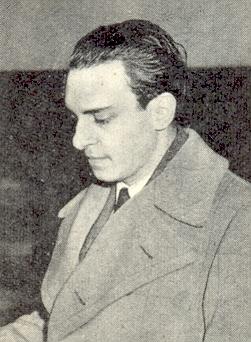
He also appeared in three group photographs (two of them featuring Alekhine) in Xeque-Mate no Estoril by Dagoberto L. Markl (Porto, 2001). If, as seems quite possible, Lupi was aged no more than about 30 when all the above-mentioned photographs were taken, that would mean that he died before he was even 40.
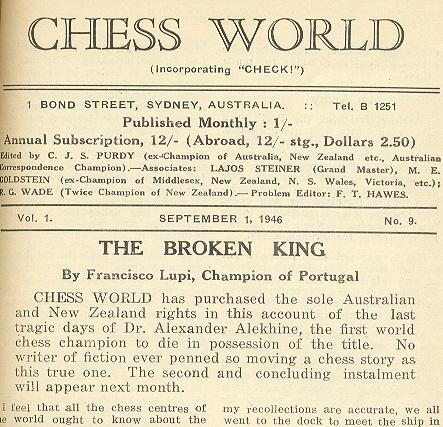
His prime contribution to chess literature was his celebrated two-part article ‘The Broken King’, the full text of which is included in Morán’s book. The English version was originally published in Chess World, 1 September 1946, pages 161-165 and 1 October 1946, pages 185-187. As may be seen above, the Editor, C.J.S. Purdy, accorded it high praise:
‘No writer of fiction ever penned so moving a chess story as this true one.’
(4388)
C.N. 50 gave, from Agonía de un Genio by Pablo Morán (Madrid, 1972), the game Mampel v Alekhine, Gijón, 16 July 1945 with annotations by Lupi, whose final comment was ‘As in the days of San Remo!’ In C.N. 156 Anthony Saidy (Santa Monica, CA, USA) suggested that Alekhine’s play against Mampel did not justify Lupi’s great enthusiasm.
The final game (Estoril, January 1946) in the short match between Alekhine and Lupi was also shown in C.N. 50.
After Alekhine’s death in 1946 the Portuguese master Francisco Lupi wrote an account of the world champion’s final phase, under the title ‘The Broken King’. From page 185 of Chess World, 1 October 1946:
‘In those last weeks, grief, sickness and poverty entirely crushed him.’
And from the following page:
‘Fifteen days before his death, I was called on the telephone and heard Dr Alekhine ask me sadly whether I wanted to work with him on “Comments on the Best Games of the Hastings Tournament”, adding: “I am completely out of money and I have to make some to buy my cigarettes”.’
See too Alekhine’s Death.
The Portuguese champion Francisco Lupi gave some further observations about Alekhine on pages 204-207 of CHESS, April 1947:
‘With all respect to Botvinnik, I am not altogether convinced that the great master and Soviet champion would have won his match against Alekhine.
I knew Alekhine well during his last years. Throughout many a journey in Spain together, en route to participate in tournaments, I have come to know his every gesture. I have seen him attired superbly and I have seen him, not so much later, looking like a tramp. It has struck me how both in his play and in himself, how extraordinarily his style revealed itself in a capacity to improvize – and a capacity to recuperate. ...
It is true that, when he received here in Lisbon the news of the British Chess Federation’s negotiations for his match against Botvinnik, the great man was at his lowest ebb. But a few days afterwards, I watched him playing so beautifully, so ingeniously in friendly conflict with the well-known English problemist G.F. Anderson – no second-rate player either – that I felt his powers of recuperation were unimpaired.
It has frequently been said that, after his last match against Euwe, Alekhine had never recaptured the fire of his San Remo days. I should answer this by saying, simply, that in his later years he inclined more towards soundness and simplicity.’
On page 205 Lupi discussed Alekhine’s game against Paul Schmidt in the Warsaw-Cracow tournament on 10 October 1941 (game 2311 in the Skinner/Verhoeven book on Alekhine). Before presenting Lupi’s account we reproduce the relevant part of the game from page 171 of the November 1941 Deutsche Schachzeitung (notes by Blümich) and page 173 of the 1 November 1941 issue of Deutsche Schachblätter (annotations by Alekhine).
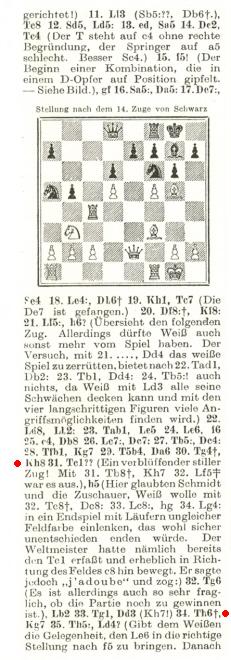
Deutsche Schachzeitung
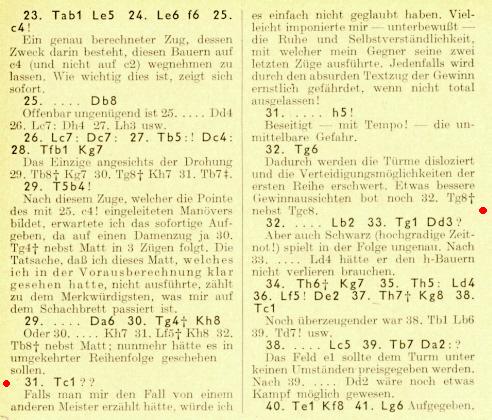
Deutsche Schachblätter
Our diagram shows the position before Alekhine played 31 Rc1 h5 32 Rg6 (instead of 31 Rb8+ Qc8 32 Rxc8+ (or 32 Bxc8) and 33 Bf5 mate):
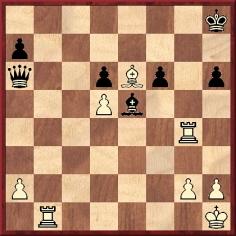
In CHESS Lupi wrote:
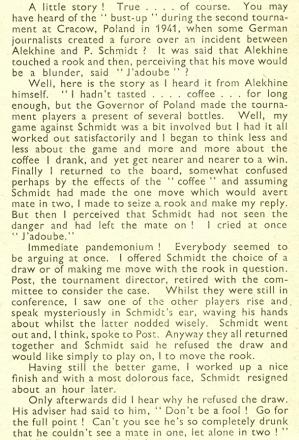
To the small number of photographs of Lupi which are available, we add one from opposite page 145 of La vida de Arturito Pomar by Juan M. Fuentes and Julio Ganzo (Madrid, 1946):
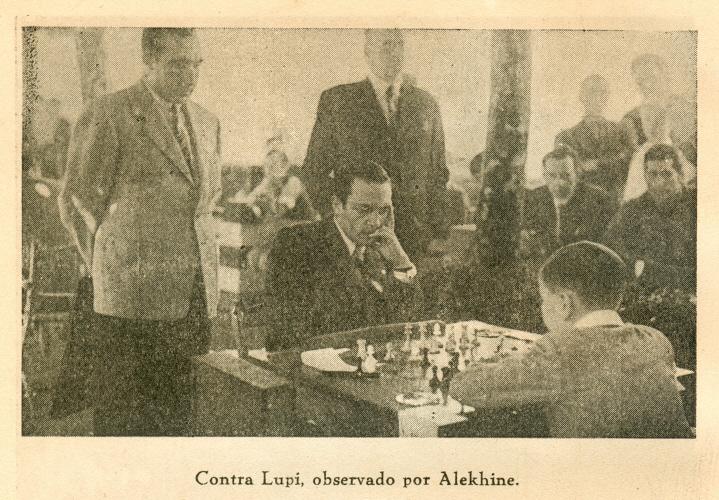
(5551)
See too Arturo Pomar (1931-2016).
Basic biographical information about Francisco Lupi is still being sought. As noted by Javier Asturiano Molina (Murcia, Spain) in Escacultura, page 29 of Ajedrez Español, January-February 1954 merely stated that Lupi had died in Madrid recently. No date of birth has yet been found.
(7479)
The privately circulated 1994 edition of Jeremy Gaige’s Biobibiography did not correct an error in the 1987 McFarland edition: Lupi’s forename was given as Francesco instead of Francisco.
An advertisement from the back cover of the Schweizerische Schachzeitung, December 1947:
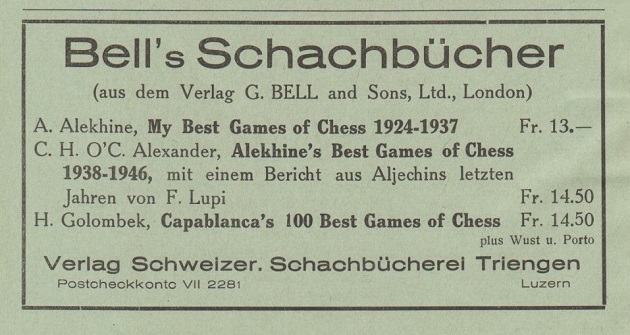
C.H.O’D. Alexander’s book was published nearly two years later, the dates in the title being 1938-1945. No material by Francisco Lupi was included, and we wonder whether the intention had been to give a new text by him or merely to reproduce the articles which, as discussed in C.N. 4388, he published shortly after Alekhine died.
(9888)
To the Archives for other feature articles.
Copyright Edward Winter. All rights reserved.